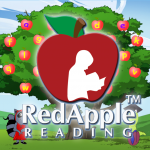Meaningful Literacy Gifts for Children
There are many gifts besides books that will encourage literacy and help children learn the value of becoming a good reader. Here are some top picks.
There are many gifts besides books that will encourage literacy and help children learn the value of becoming a good reader. Here are some top picks.
We at Red Apple Reading are ecstatic to be one of the handpicked summer learning resources on Homeschool.com’s list this year! Homeschool parents agree, Red Apple Reading is a great way to keep young kiddos in the reading loop over summer break or any time of the year. Visit Red Read more…
Contrary to what you may think, the concept of philanthropy is something that comes naturally to children because of their inclination to share and be compassionate. Not only will the introduction of charity books provide them a key understanding of global issues and encourage empathy, but children will also discover the importance of literature through the real-life, meaningful content of these titles.
Summer is a great time to take an honest look at your child’s reading progress in school and determine if an intervention is needed before the new school year begins. Here’s the last of the Reading Essentials Series.
As your child is learning to read, you may begin to have concerns about whether or not he or she is progressing at a normal rate. This is completely normal. After all, you’ve been comparing developmental notes with other parents since your child was rolling over and beginning to crawl, right?
Is your child the brightest of the bunch? Most all moms and dads think their kids are the shining stars of the class, and why shouldn’t they? In reality, though, some youngsters truly do learn at a more advanced pace, and while this can be a huge advantage for them, it’s not without its unique challenges.
 Even younger users to access ‘ABC Tree’ section as Red Apple Reading program’s makeover continues.
Even younger users to access ‘ABC Tree’ section as Red Apple Reading program’s makeover continues.
One of the most challenging conversations that parents and teachers can have involves the possibility that a child might have a reading or learning disability (RD/LD). Parents might notice at home that a child struggles with reading, or with particular aspects of reading—phonics, for example. Or, a teacher might discover during an assessment that a child is reading at a lower level than expected. When a child is having difficulty learning, parents are understandably concerned and want to know exactly what is impairing their child’s learning. It’s important to understand, though, that the root causes of reading difficulties can be incredibly diverse, and they are not always related to learning disabilities!
In this final installment of our series detailing the 5 fundamental reading skills, we’ll be looking closely at comprehension—the ability to not only read words, but understand their individual meanings and their meanings within the context of a sentence and story. Reading comprehension is, perhaps, the pinnacle of all reading skills. After all, what’s the point of being able to read words if you don’t understand them, right?
Can you imagine trying to read a good novel and having to stop to sound out every other word? How frustrating would that be? Well, that’s exactly the challenge your little one faces as he strives to become a proficient reader. In order to truly comprehend and enjoy what he’s reading, he will need to acquire fluency—the ability to read words and sentences accurately, at a reasonably quick pace, and without the need to stop to decode individual words.
A robust vocabulary is one of the most beneficial things your child can have. After all, in order to communicate effectively, we need to understand the words we hear, speak, read, and write. How can you help your child develop a rich vocabulary? Read to him! The single largest impact on a child’s vocabulary is the amount of reading he or she does.